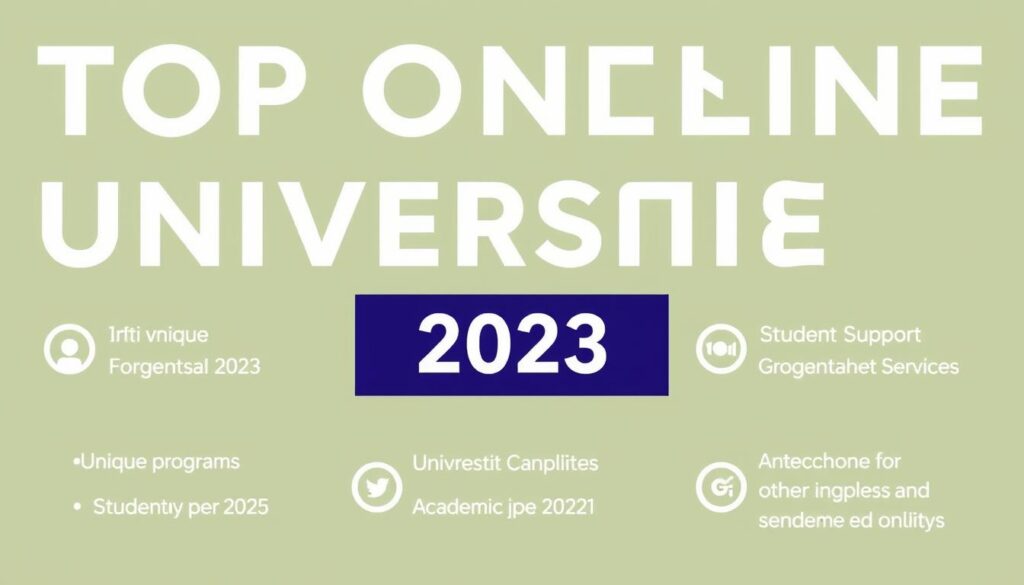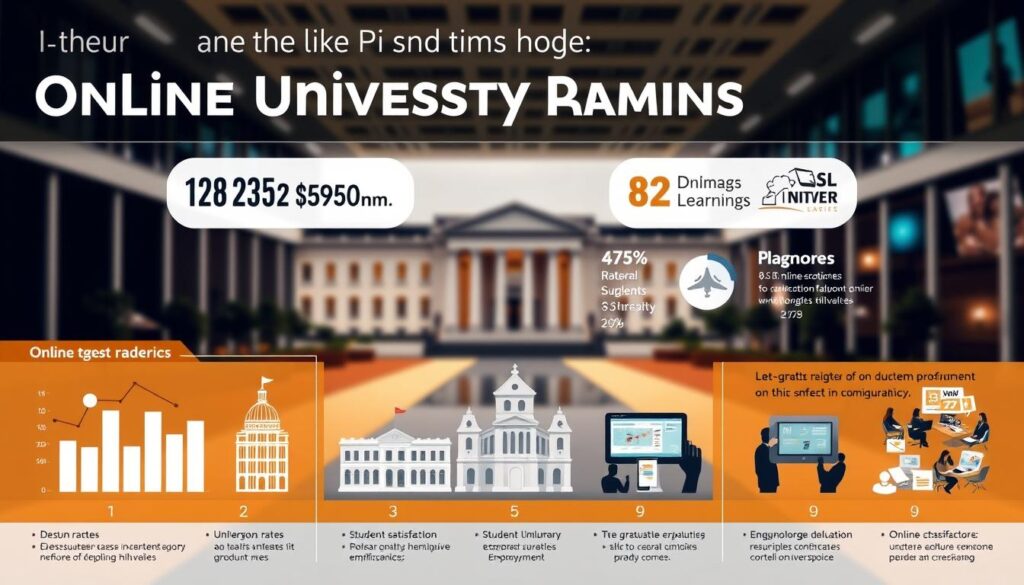The landscape of higher education has undergone significant changes in recent years, driven by technological advancements and shifting global circumstances.
As a result, more students are turning to flexible learning options to achieve their academic goals.
Our comprehensive guide explores the top-ranked institutions of 2023, providing essential information for prospective students to make informed decisions about their education and future career prospects.
By examining the criteria used to rank these institutions, we can gain valuable insights into what makes them stand out in terms of academic quality and overall value.
Table of Contents:
- The State of Online Higher Education in 2023
- Top-Ranked Online Universities of 2023
- How Online University Rankings Are Determined
- Most Popular Online Degree Programs in 2023
- Understanding the Cost of Online University Education
- Real Student Experiences at Online Universities
- Conclusion: Choosing the Right Online University for Your Future
The State of Online Higher Education in 2023
The year 2023 marks a pivotal moment in the evolution of online higher education. As technology continues to advance and global circumstances change, online learning is adapting to meet the needs of students worldwide.
Growth and Evolution of Online Learning
Online education has seen significant growth, driven by the need for flexible and accessible learning options. This growth has led to innovations in teaching methodologies and student engagement strategies, enhancing the overall experience for online learners.
- The increased demand for online programs has spurred institutions to develop more robust support systems for online students.
- Educational institutions have recognized the unique challenges of remote learning environments and are working to address them.
Impact of Recent Global Events on Online Education
Recent global events, such as the pandemic, have accelerated the adoption of online education models, forcing traditional institutions to rapidly develop or expand their digital learning capabilities. This swift transition has revealed both challenges and opportunities in the online education space.
- Students who might never have considered online learning found themselves experiencing virtual education, often discovering unexpected benefits and preferences.
- Global events have democratized access to education, allowing students from diverse geographical locations to access quality programs without relocation.
The collective experience has permanently altered perceptions about the viability and value of online education among students, educators, and employers alike.
Top-Ranked Online Universities of 2023

With the increasing demand for flexible and accessible education, the top-ranked online universities of 2023 are redefining the future of learning. These institutions are not only providing quality education but are also innovating in their approaches to online learning.
Elite Online Universities with Comprehensive Program Offerings
The elite online universities are distinguished by their comprehensive program offerings, catering to a wide range of academic and professional interests. These universities offer various degrees in fields such as business, engineering, and healthcare, ensuring that students have access to a broad spectrum of educational opportunities.
Many of these top institutions have gained recognition for their accreditation from reputable accrediting agencies, ensuring the quality and validity of the education they provide. Their programs are designed to be highly interactive, incorporating cutting-edge technologies to enhance the learning experience.
Rising Stars in the Online Education Space
Rising stars in the online education space are making significant strides by offering innovative programs and degrees that are directly aligned with industry needs. These institutions are leveraging technology to provide highly engaging educational experiences, often incorporating AI-powered tools and 24/7 technical support.
One of the key factors distinguishing these rising stars is their ability to adapt quickly to evolving market demands and student expectations. They prioritize affordability and accessibility, making quality online education available to a broader demographic. Their focus on practical skills development alongside theoretical knowledge ensures that graduates are immediately workplace-ready.
How Online University Rankings Are Determined
Understanding how online university rankings are determined is crucial for prospective students navigating the complex landscape of online education. The methodology behind these rankings involves a comprehensive evaluation of various institutional attributes that reflect academic quality, student satisfaction, and the overall educational experience.
Accreditation and Academic Quality Metrics
Accreditation status is a critical factor in determining online university rankings. Institutions accredited by recognized accrediting agencies, such as the Higher Learning Commission, demonstrate a commitment to maintaining high academic standards. Accredited higher education institutions undergo rigorous evaluation to ensure they meet specific criteria for academic quality.
Student Satisfaction and Outcomes
Student satisfaction and outcomes are also significant in ranking determinations. Universities that foster a supportive learning environment and achieve positive student outcomes, such as high graduation rates and successful career placements, are viewed favorably. “Student satisfaction is a key indicator of an institution’s ability to meet the needs of its learners,” as noted by educational researchers.
Faculty Credentials and Technology Infrastructure
Faculty qualifications and technology infrastructure play crucial roles in online university rankings. Institutions with faculty who have extensive professional experience, like an average of 28+ years, bring real-world expertise to the virtual classroom. Moreover, universities that invest in cutting-edge technology, including learning management systems and digital resources, enhance the online learning experience. 
The integration of emerging technologies, such as artificial intelligence and virtual reality, positions institutions as innovative leaders in online education. By considering these factors, online university rankings provide a comprehensive view of institutional quality and performance.
Most Popular Online Degree Programs in 2023

As we dive into 2023, the landscape of online education continues to evolve, with certain degree programs standing out for their popularity and impact. The most sought-after online degrees are those that equip students with specialized skills that are in high demand in the job market, thereby enhancing their career prospects.
Undergraduate Degrees with Highest Enrollment
Undergraduate online degree programs have seen significant enrollment in fields such as business, computer science, and healthcare. These programs are popular due to their relevance to the current job market and the opportunities they provide for career advancement.
- Business Administration degrees, with courses in management, marketing, and finance.
- Computer Science programs, focusing on software development, data structures, and algorithms.
- Healthcare-related degrees, such as nursing and health sciences.
Graduate and Professional Programs Leading the Market
At the graduate level, certain professional programs have gained prominence due to their potential to develop advanced skills and enhance career prospects. These include:
- MBA programs, with specialized concentrations in areas like healthcare management and data analytics.
- Master’s in Computer Science, focusing on emerging technologies like AI and cybersecurity.
- Healthcare Administration and Public Health graduate programs, preparing students for leadership roles.
- Education master’s degrees, particularly in educational technology and leadership.
These graduate and professional programs are designed to foster highly marketable skills, making graduates more competitive in their respective fields. By acquiring these skills, individuals can accelerate their career advancement and increase their earning potential.
Understanding the Cost of Online University Education
Understanding the true cost of online education is crucial for prospective students. The financial investment in an online degree involves more than just tuition; it encompasses a range of expenses that can vary significantly between institutions.
Tuition Comparison Across Top Online Universities
Tuition rates for online programs can differ substantially among top-ranked universities. For instance, some institutions charge per credit hour, while others have a flat rate per term. When comparing tuition costs, it’s essential to consider the total credits required for your chosen program. A comprehensive comparison can help you make an informed decision that aligns with your budget.

Financial Aid, Scholarships, and Employer Benefits
Many students rely on financial aid to fund their education. Online universities often offer various forms of assistance, including scholarships, grants, and loans. Additionally, some employers provide tuition reimbursement programs as a benefit to their employees. Exploring these options can significantly reduce the overall cost of your online degree.
Hidden Costs and Fee Structures to Consider
Beyond tuition, there are several hidden costs to be aware of. These may include technology fees, proctoring services for exams, and costs associated with required software or equipment. Furthermore, some institutions charge for transfer credit evaluation or prior learning assessment. Being aware of these potential expenses can help you plan more effectively and avoid unexpected financial burdens.
It’s also worth noting that some online programs may have residency requirements, involving travel and accommodation expenses. Understanding the full scope of costs, including these less obvious expenses, is vital for accurately calculating the total investment in your online education.
Real Student Experiences at Online Universities
Online universities have transformed the educational landscape, offering students flexible and accessible learning opportunities. This shift has enabled learners to pursue higher education while balancing other responsibilities.
Success Stories and Career Outcomes
Many students have achieved significant career advancements after completing their online degree programs. The flexibility of online courses allows learners to gain relevant skills and knowledge that can be applied directly to their work.
Online education has also opened up new opportunities for career changers and those looking to upskill. With a wide range of courses available, students can choose programs that align with their career goals and interests.
Challenges and How Students Overcome Them
While online education offers many benefits, students often face challenges such as time management, technical difficulties, and the absence of face-to-face interaction. To overcome these challenges, successful students develop structured schedules, contingency plans, and actively participate in online discussions and virtual office hours.
Gaining experience in online learning environments also helps students build self-motivation and discipline. By establishing personal accountability systems and reward structures, learners can stay motivated and focused on their academic goals, even when balancing work and other responsibilities.
Overall, online universities provide a supportive and flexible learning environment that enables students to achieve their academic and professional goals.
Conclusion: Choosing the Right Online University for Your Future
As you navigate the complex landscape of online education, selecting the right university is crucial for your future success. Choosing an online university that aligns with your career goals and provides the necessary resources is vital to achieving your academic and professional objectives.
When evaluating online universities, consider factors such as accreditation, program offerings, and faculty credentials. Ensure that the institution you choose is recognized by employers and other educational institutions, and that it provides the skills required to excel in your chosen field.
Additionally, consider the level of student support services, including academic advising, career counseling, and technical assistance. The flexibility of the program structure, technology platforms, and learning resources should also be evaluated to ensure they meet your needs.
By carefully considering these factors, you can make an informed decision and earn a degree that opens doors to new career opportunities. Ultimately, the right online university will provide you with the resources and skills necessary to succeed in your chosen career.

